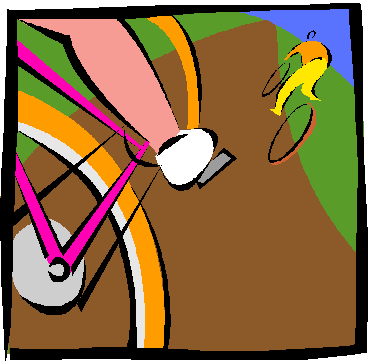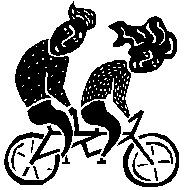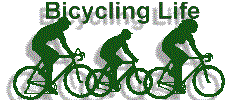Poetry - expressing the often inexpressible, in the most perfect
language possible. Perhaps poetry is to language what the bicycle is
to
transportation! In any case, there are poets who have used the
bicycle
as subject, or as metaphor, or just for fun. In this section of
Bicycling Life, we present some examples for your enjoyment.
Bicycling is a wonderfully safe activity. Yet for some people,
biking seems so scary! Some are afraid of riding in the dark. Some are
afraid of breakdowns. Some are afraid of "bonking." Some are
afraid of carnivorous canines.
But squirrels??
Read on!
The Night of Claire
A ride in the woods in the dark of the moon
Was no challenge or so it was said
So I mounted my Schwinn and I turned on my lights
And away in the evening I sped.
Slicker than owl snot my drive train did run
As I reached the first tulgey glade
Completely at ease I passed under the trees
Breathing deeply and yet unafraid.
A sudden light clicking then came to my ear
And I wondered if it was the bike.
The volume and frequency seemed to increase
And something just didn't seem right.
My crankset? My pedals? Perhaps the rear wheel?
But my spokes were stress relieved.
I'd checked all the torques and examined the forks
No fault could be conceived.
But then I remembered the horrible squirrels
That run in the woods at night.
More cunning than weasels and faster than bats
My blood ran cold with fright.
My mirror was useless, it bounced up and down
I carefully looked to the back.
Not one running there in the LED glare, not one
But the whole freaking pack!
I knew in an instant the danger I faced
For the squirrels of the East are unreal.
Like furry piranha that scamper like rats
They wanted my brand new wheel!
I knew in the morning they'd find my bones
spread out by the side of the trail.
If I couldn't pull off a quick finesse
I had to deliver the mail.
I spun and I sweated and pulled a huge gear
In the face of imminent death.
The grade was intense and my terror immense
I smelt their squirrelly breath!
Just then I remembered that in my valise
Which I'd strapped to the top of my bars
I had peanuts and trail mix and Gatorade
And a couple of candy bars.
I unzipped the bag and flung out the tools
Which only impeded my hand.
An anvil, a tow chain, a hacksaw and such
And a brand new truing stand.
I hated like fury to throw out that stand
But I needed to get to the food.
I whipped out the trail mix and tossed it back
It halted that Hell spawned brood.
I sat at the top of the hill and wheezed
As the squirrels devouered the nuts.
I'll never again take a ride on that trail
No ifs, no maybes, no buts!
[Posted on the internet by a person who wishes to remain
anonymous.]
Pablo Neruda, Chilean poet and former Chilean ambassador to
France, is regarded as one of the most important voices in contemporary poetry. Whether he is writing
about love, politics, salt or socks (Neruda published collections of odes to simple objects),
his writing combines intense passion and a magical, visionary quality.
 He was awarded the Nobel
Prize for Literature in 1971. He died in 1973.
He was awarded the Nobel
Prize for Literature in 1971. He died in 1973.
He was portrayed as one of the princicple characters in the film
"Il Postino." A beautiful film, and a film with some lovely bicycle
moments.
Here is Neruda writing about the bicycle:
Ode to Bicycles
I was walking
down
a sizzling road:
the sun popped like
a field of blazing maize,
the
earth
was hot,
an infinite circle
with an empty
blue sky overhead.
A few bicycles
passed
me by,
the only
insects
in
that dry
moment of summer,
silent,
swift,
translucent;
they
barely stirred
the air.
Workers and girls
were riding to their
factories,
giving
their eyes
to summer,
their heads to the sky,
sitting on the
hard
beetle backs
of the whirling
bicycles
that whirred
as they rode by
bridges, rosebushes, brambles
and midday.
I thought about evening when
the boys
wash up,
sing, eat, raise
a cup
of wine
in honor
of love
and life,
and waiting
at the door,
the bicycle,
stilled,
because
only moving
does it have a soul,
and fallen there
it isn't
a translucent insect
humming
through summer
but
a cold
skeleton
that will return to
life
only
when it's needed,
when it's light,
that is,
with
the
resurrection
of each day.
Pablo Neruda
William Stafford's poetry is known for its combination of
beautiful, common language and simple yet uncommon truths. He published more than 50 books in his lifetime
and won the National Book Award for "Traveling Through the Dark." Stafford was named
Poet Laureate of Oregon in 1975. He died in 1993.
"Maybe Alone On My Bike" copyright 1975 by William
Stafford from NORTH BY WEST (Spring Rain Press). Reprinted by
permission of the Estate of William Stafford.
For more
information on William Stafford, check out the William Stafford Memorial Page
MAYBE ALONE ON MY BIKE
I listen, and the mountain lakes
hear snowflakes come on those winter wings
only the owls are awake to see,
their radar gaze and furred ears
alert. In that stillness a meaning shakes;
And I have thought (maybe alone
on my bike, quaintly on a cold
evening pedaling home), Think!--
the splendor of our life, its current unknown
as those mountains, the scene no one sees.
O citizens of our great amnesty:
we might have died. We live. Marvels
coast by, great veers and swoops of air
so bright the lamps waver in tears,
and I hear in the chain a chuckle I like to hear.
William Stafford
 And how about a poem on the pleasures of tandem bikes?
And how about a poem on the pleasures of tandem bikes?
Um... for
the "captain" up front, that is! The "stoker" in the
rear has a much different experience, to hear Tony Pranses tell it! And what does a
"stoker" do? Why, he keeps the engine's fire burning by...
SHOVELIN' COAL
There are those who think the tandem is the instrument sublime
For the serious cycle-tourist, and the man concerned with time.
It has drive and rolls much faster as it gobbles up the track,
But it's quite another matter to the guy who sits in back...shovelin'
coal.
But just look at the advantages with twice the power at hand,
And half the wind resistance as it travels o'er the land.
The weight is less than double. This alone gives peace of mind.
But it's still another matter to the guy who sits behind...shovelin'
coal.
Yes, the man up front is master. It is he who shifts the gears.
He decides when brakes are needed, and on top of this he steers.
He can go the wrong direction and wind up in Timbuktu;
But refuses any protest from the guy who's number two...shovelin'
coal.
It's just like a locomotive, with the front man engineer,
He sits back and shouts instructions to the fireman in the rear.
It's the way to run a railroad. With a bike it's not so sweet
To the sweating, swearing fellow on the secondary seat...shovelin'
coal.
True, the pilots work the throttles while their partners work the
flaps.
They are barely more than slaves -- a society of saps.
Co-pilots do the labor. They are not supposed to feel.
It's likewise with the suckers above the rearward wheel...shovelin'
coal.
His view ahead is blank and to peek would be a sin;
So he can't see where he's going -- only places where he's been.
He would love to lean to starboard when to port they make a turn,
But such pleasure is verboten to the fellow in the stern...shovelin'
coal.
Yet there will be retribution on some future day in hell,
When all tandem frames have melted, and the tandem leaders yell.
In agony they writhe, and some mercy they request;
But the back men just keep doing the thing they've done the
best...shovelin' coal.
Tony Pranses
(Reprinted from the Greater Boston Council, AYH,
"Spokesman", in
"Bicycling", August 1976
A ride through time.
I ride through time,
Stretching it out with surreal distortion,
I ride for freedom,
I am immortal, freedom from the fear of death,
I push myself to the limit of my mortal frame,
then transcend that human pain,
enter into that fourth dimension.
My wheels no longer touch the ground,
they’re floating on passionate effort,
a whole hearted singleminded effort,
the rhythm of a perfect circle,
a pulsing rhythm that rises above the worlds woes.
Movement brings freedom.
Unfettered yet fitting in perfectly,
unconventionaly conventional,
an independant form of movement.
I know exactly how far I have traveled,
I can feel how far I have moved.
Allow the spirit of your surroundings feed your movement,
the harder I push the more I merge with my surroundings,
my aim is to reach that point of effortless movement,
turbo boosted blood pumping round my muscles,
my spirit is one with my body,
brain, muscles and spirit in total harmony,
producing a pure singleminded effort,
human body, trees, mountains rivers,spirits and bike.
Carlo Castelvecchi. May 2002 - See
his web site.
Bicycle commute
 Stillness returns as I retrace the path
Stillness returns as I retrace the path
Daily rhythms hold at workday close.
Spirit wind is a constant companion.
Even when the leaves are idle,
The breathe of life is called forth
By the joy of movement.
Time is irrelevant, the sun moves
The mind to reflect on the day
As gravel stones sing a broken melody
And the horizon communicates purpose.
Machine, sacred ring of Black Elk's vision
Revealed in steel and sweat.
Alan Bender
Volga, SD
October Warm
I cannot turn
down the road
to the house
where dinner waits
The morning's frost
into October warm evaporated
and the road stretches through red and gold
to a sky as blue as the black of space
The rhythm of heart and lungs
of legs and cranks
the whisper of chain and gears
of tires on pavement
form a mantra that chants
There is no past
no future
there only
is.
by Michael Blotzer
MULGA BILL'S BICYCLE
'Twas Mulga Bill, from Eaglehawk, that caught the cycling craze;
He turned away the good old horse that served him many days;
He dressed himself in cycling clothes, resplendent to be seen;
He hurried off to town and bought a shining new machine;
And as he wheeled it through the door, with air of lordly pride,
The grinning shop assistant said, "Excuse me, can you
ride?"
"See here, young man," said Mulga Bill, "from Walgett
to the sea,
From Conroy's Gap to Castlereagh, there's none can ride like me.
I'm good all round at everything as everybody knows,
Although I'm not the one to talk - I hate a man that blows.
But riding is my special gift, my chiefest, sole delight;
Just ask a wild duck can it swim, a wildcat can it fight.
There's nothing clothed in hair or hide, or built of flesh or steel,
There's nothing walks or jumps, or runs, on axle, hoof, or wheel,
But what I'll sit, while hide will hold and girths and straps are
tight:
I'll ride this here two-wheeled concern right straight away at
sight."
'Twas Mulga Bill, from Eaglehawk, that sought his own abode,
That perched above Dead Man's Creek, beside the mountain road.
He turned the cycle down the hill and mounted for the fray,
But 'ere he'd gone a dozen yards it bolted clean away.
It left the track, and through the trees, just like a silver steak,
It whistled down the awful slope towards the Dead Man's Creek.
It shaved a stump by half an inch, it dodged a big white-box:
The very wallaroos in fright went scrambling up the rocks,
The wombats hiding in their caves dug deeper underground,
As Mulga Bill, as white as chalk, sat tight to every bound.
It struck a stone and gave a spring that cleared a fallen tree,
It raced beside a precipice as close as close could be;
And then as Mulga Bill let out one last despairing shriek
It made a leap of twenty feet into the Dean Man's Creek.
'Twas Mulga Bill, from Eaglehawk, that slowly swam ashore:
He said, "I've had some narrer shaves and lively rides before;
I've rode a wild bull round a yard to win a five-pound bet,
But this was the most awful ride that I've encountered yet.
I'll give that two-wheeled outlaw best; it's shaken all my nerve
To feel it whistle through the air and plunge and buck and swerve.
It's safe at rest in Dead Man's Creek, we'll leave it lying still;
A horse's back is good enough henceforth for Mulga Bill."
By A.B. "Banjo" Paterson
